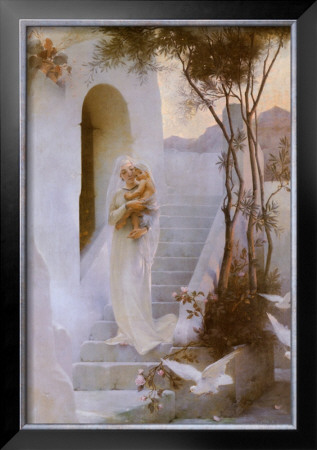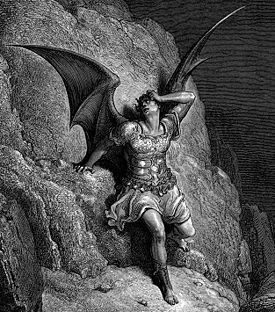They were surprised that this stranger hadn't heard about the events that had taken place in Jerusalem; about the prophet Jesus, who they had hoped to be the messiah, but was crucified. They then explained that some women from their group had that very morning gone to Jesus' tomb and then rushed back to report that the tomb was open and the body of Jesus gone, and that two men of their group had then gone to the grave to see for themselves and confirmed what the women had said.
After listening to this, the stranger remarked, "Are you so slow to understand what the prophets foretold about the messiah; how he must first suffer and then enter his glory?" The stranger then proceeded to explain what the prophets, starting with Moses, said about this Jesus, the messiah.
When they finally arrived at Emmaus, the stranger made as if to continue on. The two disciples begged him to stay and eat supper with them since it was getting late. As they sat at supper, the stranger took the bread, blessed it, broke it and gave it to them. At that moment they recognized the stranger as Jesus himself, and then Jesus disappeared from their sight.
The disciples exclaimed that it was Jesus and then recounted how their hearts burned as they listened to him explain the Scriptures on the road to Emmaus. The two then quickly returned to Jerusalem and reported what they had experienced.
This is my own paraphrase of what Saint Luke wrote in his Gospel, chapter 24:13-35.
 |
| The Emmaus Disciples by Abraham Bloemaert |
Christianity is an incarnational religion. What does that mean?
It means that God took on human flesh, became Incarnate, as Jesus of Nazareth. Jesus the Christ is fully human and fully divine. He is both man and God.
Some of us may remember tales learned at school about the Greek gods who sometimes took human or animal form. For anyone familiar with both the Greek myths and Christianity, the comparison ends there. The Greek gods took the form of creatures not for the benefit of man but simply for their own desires (typically through rape or some other trickery).
The God of Abraham, Isaac and Jacob became Incarnate purely for his limitless love of the human race he had created. Through Adam and Eve's rebellion against God, the relationship between humanity and God was broken. Because of this, death entered the world and humans were barred from heaven - that is, eternal bliss with God. This breach in the relationship between God and humans needed to be mended through atonement, but weak humans alone would never be able to accomplish this reconciliation. Therefore, God became man in order to reconcile God and man.
Furthermore, God wished to remain physically united with mankind beyond the 33 years he walked the earth as Jesus of Nazareth. God is physically united with us today both in the Eucharist and in his one, holy, catholic and apostolic Church.
For this post I wish to deal solely with the Eucharist. The word Eucharist is Greek and means "thanksgiving." It is the name we give to the ritual whereby simple bread and wine become the body, blood, soul and divinity of Jesus Christ. It is by partaking of the body and blood of Jesus that we believers are in Christ, and Christ is in us.
The Gospels of Matthew, Mark and Luke tell that on the night before he was crucified, when Jesus dined with his Apostles, he took bread, blessed it and said, "Take and eat, this is my body, which will be given up for you." Then he took a cup of wine, gave thanks and said, "Take and drink, this is the cup of my blood . . . it will be shed for you."
In case anyone thinks Jesus was simply speaking metaphorically and that the bread and wine are merely symbolic of his body and blood, chapter 6 of John's Gospel should dispel that idea.
This chapter begins with the story of Jesus multiplying the loaves and fishes to feed a great multitude of people. Next we read how that night the Apostles took a boat to the other side of the Sea of Galilee but Jesus had stayed behind to pray. A strong wind came up and the Apostles had to row against the wind. Suddenly they saw Jesus walking on the water and they were afraid. Jesus said, "It is I. Do not be afraid." Immediately the boat arrived at the shore to which they were heading.
The following day, the crowds that Jesus had fed came looking for him, asking for a sign so that they could believe in him (How ironic! The miraculous multiplication of the loaves and fishes wasn't sign enough?). It is then that Jesus gives what we now call 'The Bread of Life Discourse.' Jesus explains that he is the bread from heaven and that all who eat his flesh shall have everlasting life.
Cannibalism is abhorrent to the Jews and those in the crowd listening to this asked, "How can this man give us his flesh to eat?" Jesus does NOT respond with an explanation that he's speaking metaphorically. No, instead he reaffirms what he's already said, "I say to you, unless you eat the flesh of the Son of Man and drink his blood, you do not have life within you. Whoever eats my flesh and drinks my blood has eternal life, and I will raise him on the last day. For my flesh is true food, and my blood is true drink. Whoever eats my flesh and drinks my blood remains in me and I in him." (John 6:53-56)
In the original Greek version of John's Gospel, the word translated as 'eat' isn't the usual Greek word for how humans eat, but how animals eat, and has more the sense in English of 'to bite, chew or gnaw.'
Jesus left no doubt as to what he was saying. The crowd certainly understood him clearly, saying, "This saying is hard; who can accept it?" Again, Jesus doesn't attempt an explanation that would be easier for his listeners to accept. Instead he asks, "Does this shock you? What if you were to see the Son of Man ascending to where he was before?" As a result many of his followers left him and returned home.
The twelve apostles were surely as baffled by Jesus' words, but they remained. (After all, they had experienced the multiplication of the loaves and fishes and Jesus walking on water, all within the previous 24 hours.) Jesus asked them, "Do you also want to leave?" Simon Peter responded, "Master, to whom shall we go? You have the words of eternal life."
(visit this website for a more detailed explanation of John chapter 6: http://lonelypilgrim.com/2012/08/19/eat-my-flesh-and-drink-my-blood-a-crucial-passage-the-catholic-eucharist-and-bad-protestant-commentary/)
There's a lot more that could be said on this topic, but I'll add just one more thing. In Saint Paul's First Letter to the Corinthians (11:23-27), after he restates how Jesus instituted the Eucharistic ritual, where bread and wine become his body and blood, Paul goes on to warn, "Therefore whoever eats the bread or drinks the cup of the Lord unworthily will have to answer for the body and blood of the Lord."
The Catholic Church celebrates the Feast of Corpus Christi (the Body of Christ) on the Thursday after Trinity Sunday (which comes the Sunday after Pentecost). In most American dioceses, Corpus Christi has been moved to the Sunday following Trinity Sunday. So, in Poland it's on May 30th this year, but on June 2nd in America. It's a national holiday in Poland.
In Polish churches, as in much of the world, this day is marked by processions of a consecrated host, the real body and blood of Jesus Christ, through the streets near the church. Young girls lead the procession strewing flower petals in honor of our Lord and King Jesus Christ.
Corpus Christi procession in Poland












